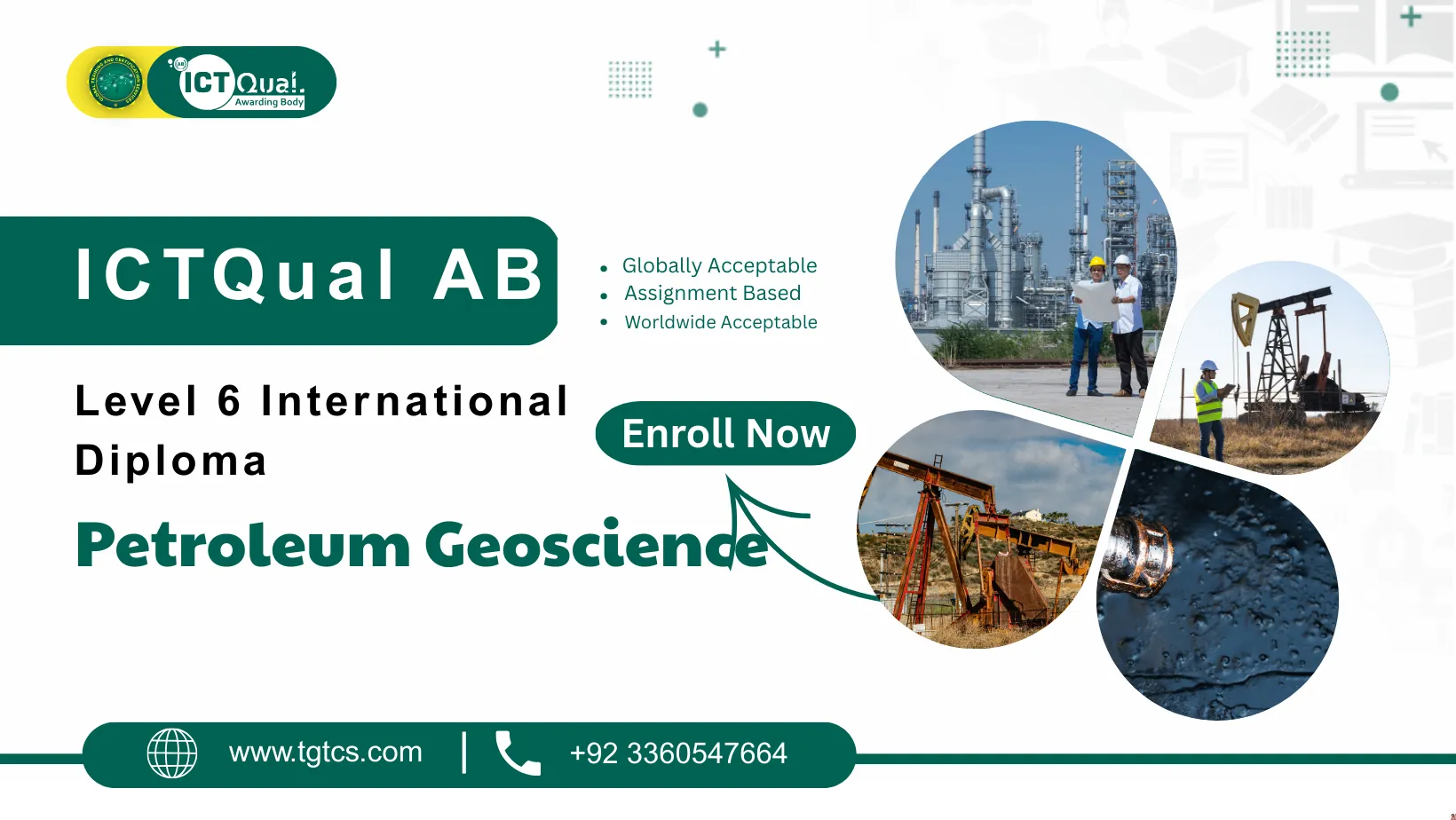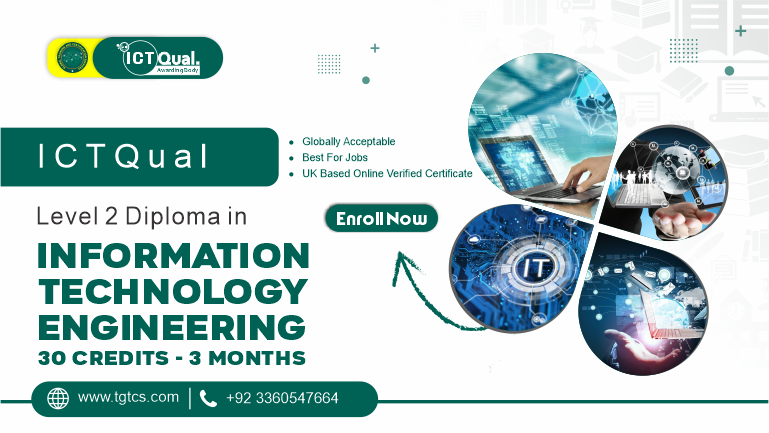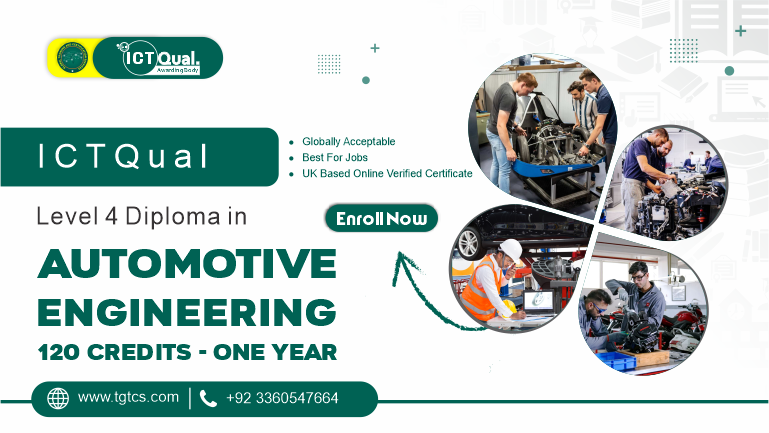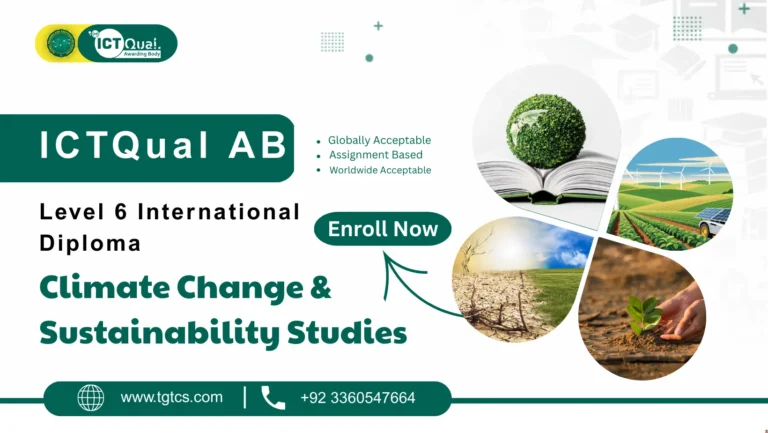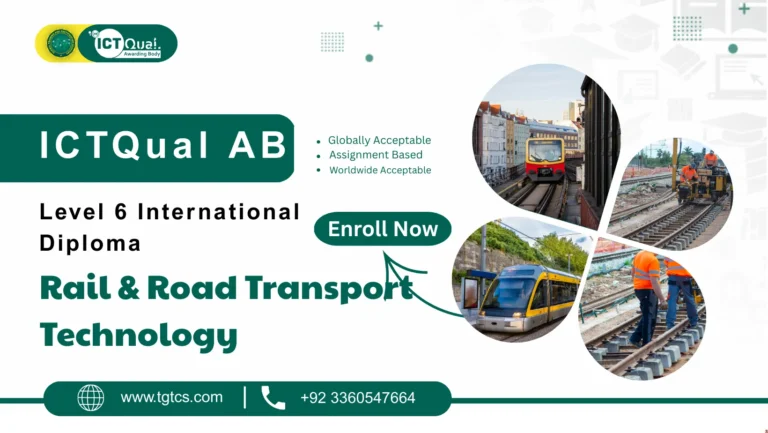ICTQual AB Level 6 International Diploma in Petroleum Geoscience
The exploration and production of hydrocarbons remain critical to global energy security, making expertise in petroleum geoscience essential for industry professionals. The ICTQual AB Level 6 International Diploma in Petroleum Geoscience equips learners with advanced technical knowledge, analytical skills, and practical applications necessary for careers in oil and gas exploration, reservoir evaluation, and geoscientific analysis.
This comprehensive program covers the fundamentals and advanced concepts of petroleum geology, geophysics, reservoir characterization, basin analysis, and hydrocarbon exploration techniques. Learners will gain hands-on experience in interpreting geological and geophysical data, assessing reservoirs, and applying modern software tools used in the industry. The course emphasizes critical thinking, problem-solving, and decision-making to prepare participants for real-world challenges in energy projects.
By combining theoretical foundations with applied learning, the program develops skills in seismic interpretation, petrophysical analysis, basin modeling, and resource estimation. Participants will also learn environmental management, risk assessment, and industry-standard reporting practices, ensuring they can operate efficiently while complying with regulatory frameworks.
Graduates of this diploma will be prepared for careers such as petroleum geoscientist, reservoir analyst, exploration geologist, energy consultant, and project manager. With British Council verifiable, MOFA and Embassy attestable certification, this qualification provides international recognition and credibility, enhancing career prospects, job opportunities, and eligibility for Iqama approval.
The Global Training and Certification Services is Approved Training Centre of ICTQual AB UK Ltd
Start your professional journey with the ICTQual AB Level 6 International Diploma in Petroleum Geoscience, designed to provide learners with advanced knowledge and practical skills in petroleum geology, reservoir analysis, and hydrocarbon exploration.
Flexible, Assignment-Based Learning
- Fully 360-credit program, entirely assignment-based.
- Study at your own pace from anywhere in the world.
- Suitable for both fresh graduates and experienced professionals.
International Recognition
- British Council verifiable, ensuring global credibility.
- MOFA and Embassy attestable, ideal for international documentation.
- Highly valued for career advancement, job opportunities, and Iqama approval.
Suitable for Fresh Learners
- Complete all 36 mandatory assignments within three years.
- Gain comprehensive knowledge in petroleum geology, reservoir characterization, basin evaluation, and geophysics.
- Learn environmental, safety, and industry best practices.
Fast-Track Option for Experienced Professionals
- Submit verifiable evidence of 6+ years of relevant work experience.
- Demonstrate expertise in professional discussion meetings with an ICTQual AB Approved Assessor.
- Achieve certification without completing all mandatory assignments, saving time while validating prior experience.
Career-Enhancing Skills
- Develop technical, analytical, and strategic skills in petroleum exploration and geoscience.
- Prepare for roles such as petroleum geoscientist, reservoir analyst, exploration geologist, and energy consultant.
- Contribute effectively to global exploration and production projects in the oil and gas industry.
By completing the ICTQual AB Level 6 International Diploma in Petroleum Geoscience, learners will gain a globally recognized qualification that empowers them to advance their careers, achieve professional credibility, and excel in the competitive energy sector.
Mandatory Unit
Year 1 – Foundation in Petroleum Geoscience
- Principles of Geology and Earth Sciences
- Introduction to Petroleum Exploration
- Mineralogy and Petrology
- Sedimentology and Stratigraphy
- Geophysical Methods in Exploration
- Introduction to Reservoir Engineering
- Drilling Operations Fundamentals
- Petroleum Fluid Properties
- Geoscience Data Collection Techniques
- Health, Safety, and Environmental Awareness
- Scientific Report Writing
- Introduction to Geospatial Technology
Year 2 – Intermediate Petroleum Geoscience
- Structural Geology and Tectonics
- Advanced Sedimentary Basin Analysis
- Reservoir Characterisation and Modelling
- Petrophysics and Well Logging
- Seismic Interpretation and Geophysics
- Drilling Fluid and Wellbore Stability
- Production Systems and Flow Mechanics
- Hydrocarbon Exploration Techniques
- Risk Assessment and Project Management
- Environmental Impact and Sustainability
- GIS Applications in Petroleum Geoscience
- Technical Communication and Data Analysis
Year 3 – Advanced Petroleum Geoscience
- Advanced Reservoir Simulation
- Enhanced Oil Recovery Techniques
- Petroleum Economics and Project Evaluation
- Exploration Strategy and Field Development
- Advanced Geophysics and Seismic Modelling
- Subsurface Fluid Flow and Reservoir Dynamics
- Drilling Design and Well Planning
- Petroleum Laboratory Techniques
- Energy Transition and Sustainable Practices
- Research Methods in Geoscience
- Capstone Project in Petroleum Geoscience
- Professional Development and Leadership in Energy
The ICTQual AB Level 6 International Diploma in Petroleum Geoscience is designed to equip learners with advanced technical knowledge, practical skills, and strategic expertise essential for a successful career in the global oil and gas industry.
Year 1 – Foundation in Petroleum Geoscience
Principles of Geology and Earth Sciences
- Understand fundamental concepts of geology, earth structure, and geological processes.
- Explore the composition and properties of rocks and minerals.
- Analyze geological formations and their relevance to petroleum systems.
- Apply geoscience principles to real-world exploration scenarios.
Introduction to Petroleum Exploration
- Learn the stages of petroleum exploration from discovery to production.
- Understand exploration strategies and hydrocarbon prospecting.
- Gain knowledge of basin evaluation and geological mapping.
- Develop awareness of the economic and environmental aspects of exploration.
Mineralogy and Petrology
- Identify and classify minerals and rock types.
- Analyze rock composition, texture, and formation processes.
- Apply petrological techniques to reservoir characterization.
- Understand mineralogical influences on drilling and production operations.
Sedimentology and Stratigraphy
- Study sedimentary processes and depositional environments.
- Analyze stratigraphic sequences for hydrocarbon potential.
- Apply techniques to interpret reservoir layers and structures.
- Evaluate sedimentary basins for exploration opportunities.
Geophysical Methods in Exploration
- Understand geophysical survey techniques including seismic, gravity, and magnetic methods.
- Interpret geophysical data for hydrocarbon detection.
- Apply geophysical principles to field exploration.
- Identify subsurface structures using geophysical methods.
Introduction to Reservoir Engineering
- Learn fundamental reservoir properties and fluid behavior.
- Understand reservoir pressure, porosity, and permeability.
- Apply basic engineering principles to reservoir management.
- Analyze reservoir performance for efficient hydrocarbon recovery.
Drilling Operations Fundamentals
- Understand drilling rig components and operations.
- Learn basic well construction techniques and safety practices.
- Explore drilling methods and well planning basics.
- Analyze operational risks and implement mitigation strategies.
Petroleum Fluid Properties
- Study the physical and chemical properties of oil, gas, and water.
- Understand fluid phase behavior and reservoir interactions.
- Analyze fluid properties for exploration and production applications.
- Apply laboratory and field methods for fluid characterization.
Geoscience Data Collection Techniques
- Learn field sampling, logging, and data acquisition methods.
- Collect and interpret geological, geophysical, and petrophysical data.
- Ensure accuracy and reliability of collected data.
- Integrate field data into exploration and reservoir analysis.
Health, Safety, and Environmental Awareness
- Understand HSE regulations and standards in the petroleum industry.
- Identify hazards in exploration and drilling operations.
- Develop safety management plans for field activities.
- Implement sustainable and environmentally responsible practices.
Scientific Report Writing
- Develop skills for writing clear and professional scientific reports.
- Present geological and engineering data effectively.
- Apply standard reporting formats used in the petroleum industry.
- Communicate technical findings to stakeholders accurately.
Introduction to Geospatial Technology
- Understand GIS and remote sensing applications in petroleum geoscience.
- Collect, analyze, and visualize spatial data for exploration projects.
- Integrate geospatial information into decision-making.
- Apply mapping tools to support reservoir and field analysis.
Year 2 – Intermediate Petroleum Geoscience
Structural Geology and Tectonics
- Analyze geological structures and tectonic processes affecting reservoirs.
- Understand faulting, folding, and stress distribution in basins.
- Apply structural principles to exploration and drilling projects.
- Interpret subsurface formations for hydrocarbon potential.
Advanced Sedimentary Basin Analysis
- Evaluate sedimentary basin formation and evolution.
- Analyze depositional environments and reservoir distribution.
- Integrate stratigraphy, tectonics, and geophysics in basin assessment.
- Identify key factors influencing hydrocarbon accumulation.
Reservoir Characterisation and Modelling
- Develop 3D reservoir models using geological and engineering data.
- Assess reservoir heterogeneity, porosity, and permeability.
- Apply modeling techniques to optimize hydrocarbon recovery.
- Support reservoir management and production planning.
Petrophysics and Well Logging
- Interpret well logs to assess formation properties.
- Understand petrophysical measurements and their applications.
- Integrate log data into reservoir evaluation and modeling.
- Identify hydrocarbon zones and reservoir quality parameters.
Seismic Interpretation and Geophysics
- Analyze seismic data to identify subsurface structures.
- Interpret geophysical anomalies and hydrocarbon indicators.
- Integrate seismic results with geological models.
- Support exploration decision-making using geophysical analysis.
Drilling Fluid and Wellbore Stability
- Understand properties and selection of drilling fluids.
- Apply fluid management to maintain wellbore integrity.
- Monitor well parameters to prevent instability and formation damage.
- Implement environmental and safety best practices.
Production Systems and Flow Mechanics
- Learn fundamentals of hydrocarbon production systems.
- Understand multiphase flow and reservoir-to-surface dynamics.
- Apply principles for optimizing production efficiency.
- Troubleshoot operational challenges in production systems.
Hydrocarbon Exploration Techniques
- Explore conventional and unconventional hydrocarbon exploration methods.
- Evaluate prospecting tools and geoscience data integration.
- Apply exploration strategies to maximize success rates.
- Incorporate risk assessment in exploration planning.
Risk Assessment and Project Management
- Identify technical, operational, and environmental risks.
- Develop mitigation strategies for drilling and exploration projects.
- Apply project management principles to plan and execute operations.
- Monitor project performance using KPIs and industry standards.
Environmental Impact and Sustainability
- Understand environmental regulations and sustainability practices.
- Assess ecological impact of exploration and production activities.
- Implement mitigation measures to minimize environmental harm.
- Promote sustainable practices in petroleum geoscience projects.
GIS Applications in Petroleum Geoscience
- Apply GIS technology to map reservoirs and analyze spatial data.
- Integrate geospatial tools in exploration and production planning.
- Visualize geological and geophysical data effectively.
- Support decision-making using spatial analytics in the oil and gas industry.
Technical Communication and Data Analysis
- Develop skills for clear technical reporting and presentations.
- Analyze complex datasets for exploration and production insights.
- Apply statistical and computational tools for geoscience data.
- Communicate findings effectively to stakeholders and decision-makers.
Year 3 – Advanced Petroleum Geoscience
Advanced Reservoir Simulation
- Develop and apply dynamic reservoir simulation models.
- Predict reservoir performance under various production scenarios.
- Integrate geological, petrophysical, and engineering data into simulations.
- Optimize hydrocarbon recovery and production strategies.
Enhanced Oil Recovery Techniques
- Understand secondary and tertiary recovery methods.
- Apply techniques such as waterflooding, gas injection, and chemical EOR.
- Evaluate the efficiency and feasibility of enhanced recovery methods.
- Integrate EOR strategies into field development planning.
Petroleum Economics and Project Evaluation
- Analyze the economic viability of exploration and production projects.
- Apply cost estimation, budgeting, and financial modeling techniques.
- Assess project risks, returns, and investment opportunities.
- Make informed decisions for project planning and resource allocation.
Exploration Strategy and Field Development
- Develop comprehensive exploration and development plans.
- Integrate geological, geophysical, and reservoir data into strategies.
- Optimize field development to maximize production efficiency.
- Implement sustainable practices in exploration and production projects.
Advanced Geophysics and Seismic Modelling
- Interpret complex seismic datasets for subsurface analysis.
- Apply seismic modeling techniques to predict reservoir properties.
- Integrate geophysical results with geological and reservoir models.
- Support decision-making in exploration and field development.
Subsurface Fluid Flow and Reservoir Dynamics
- Understand multiphase fluid flow in porous media.
- Analyze reservoir pressure, saturation, and fluid movement.
- Apply modeling techniques to predict production behavior.
- Optimize reservoir management and enhance recovery efficiency.
Drilling Design and Well Planning
- Develop advanced drilling plans for exploration and production wells.
- Optimize well trajectories, casing, and completion designs.
- Evaluate operational risks and implement mitigation strategies.
- Ensure compliance with safety and environmental regulations.
Petroleum Laboratory Techniques
- Perform laboratory analyses of reservoir rocks and fluids.
- Apply petrophysical and geochemical testing methods.
- Interpret lab results to support exploration and production decisions.
- Ensure accuracy and reliability of experimental data.
Energy Transition and Sustainable Practices
- Understand the impact of energy transition on the petroleum sector.
- Implement sustainable and environmentally responsible practices.
- Integrate renewable energy considerations into hydrocarbon projects.
- Promote industry sustainability while maintaining operational efficiency.
Research Methods in Geoscience
- Apply scientific research methodologies in petroleum geoscience projects.
- Conduct literature reviews, field studies, and data analysis.
- Present findings using professional and technical reporting standards.
- Develop solutions based on evidence and best practices.
Capstone Project in Petroleum Geoscience
- Integrate knowledge and skills from all program units into a major project.
- Solve real-world petroleum geoscience challenges.
- Demonstrate technical, analytical, and strategic expertise.
- Present project outcomes professionally to assessors and stakeholders.
Professional Development and Leadership in Energy
- Develop leadership, project management, and team collaboration skills.
- Prepare for senior roles such as petroleum geoscientist or reservoir analyst.
- Enhance networking, communication, and lifelong learning capabilities.
- Advance career prospects in the global oil and gas industry.
Start your journey in the oil and gas sector with the ICTQual AB Level 6 International Diploma in Petroleum Geoscience, designed to provide learners with technical expertise, analytical skills, and international recognition for a successful career in petroleum geoscience and energy projects.
Advanced Technical Knowledge
- Gain in-depth understanding of petroleum geology, reservoir evaluation, and geophysics.
- Learn drilling operations, subsurface fluid dynamics, and well planning techniques.
- Develop expertise in basin analysis, seismic interpretation, and hydrocarbon exploration.
- Understand environmental and sustainable practices in petroleum projects.
Practical Skills and Industry Applications
- Apply theoretical knowledge to real-world exploration, production, and reservoir challenges.
- Use geoscience software and simulation tools for modeling and analysis.
- Develop problem-solving, decision-making, and risk assessment capabilities.
- Prepare professional reports and technical documentation for stakeholders.
Career Advancement and Global Recognition
- Achieve a British Council verifiable, MOFA and Embassy attestable qualification.
- Gain globally recognized certification, enhancing job prospects and Iqama approval.
- Open doors to roles such as petroleum geoscientist, reservoir analyst, exploration geologist, and energy consultant.
Flexible, Self-Paced Learning
- Complete a fully assignment-based program at your own pace from anywhere in the world.
- Fresh learners complete all 36 mandatory assignments within three years.
- Experienced professionals can fast-track certification through professional discussion assessments.
Leadership and Professional Development
- Develop leadership, project management, and team collaboration skills.
- Enhance communication and stakeholder management capabilities.
- Prepare for senior technical and managerial roles in global petroleum and energy projects.
By completing the ICTQual AB Level 6 International Diploma in Petroleum Geoscience, learners will be fully equipped to advance their careers, gain international recognition, and excel in the competitive global energy sector.
Start your professional journey with the ICTQual AB Level 6 International Diploma in Petroleum Geoscience by understanding the types of learners who will benefit most from this globally recognized qualification. This program is designed to develop technical expertise, analytical skills, and career-ready competencies in petroleum geoscience.
Aspiring Petroleum Geoscientists
- Gain foundational and advanced knowledge in geology, geophysics, and engineering.
- Prepare for technical roles in hydrocarbon exploration and production projects.
Energy Project Managers and Supervisors
- Enhance project management, risk assessment, and operational leadership skills.
- Manage exploration and production projects efficiently, both onshore and offshore.
Industry Consultants and Analysts
- Develop expertise in reservoir evaluation, seismic interpretation, and resource estimation.
- Provide data-driven insights and recommendations to optimize petroleum projects.
Fresh Graduates and Career Starters
- Obtain a globally recognized certification at your own pace through assignment-based learning.
- Build practical skills and professional credibility to enter the competitive oil and gas industry.
Experienced Professionals Seeking Fast-Track Recognition
- Validate prior experience via professional discussion assessments.
- Achieve certification quickly while demonstrating competence in petroleum geoscience.
By completing this course, learners will be equipped to advance their careers, gain international recognition, and excel in the global oil and gas industry.
Course Overview
Course Level
Level 6
Course Units
36 Units
Credits
360
Duration
3 years
